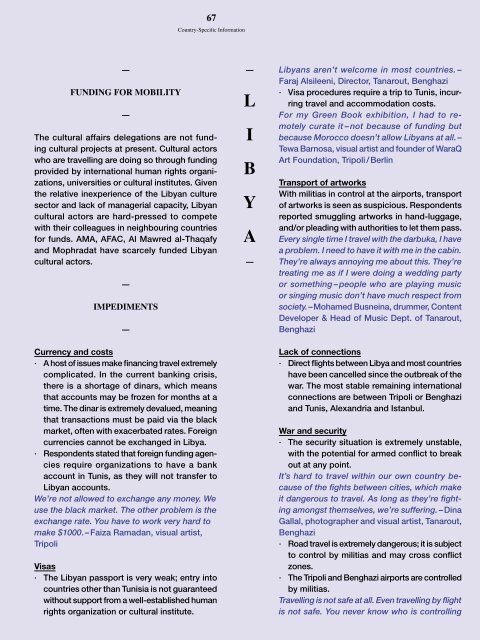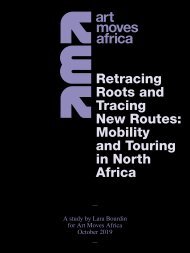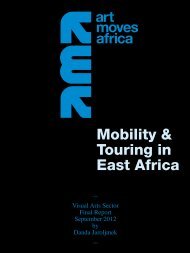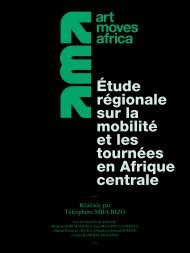Art Moves Africa – Retracing Roots and Tracing New Routes: Mobility and Touring in North Africa
A study by Lara Bourdin for Art Moves Africa, October 2019
A study by Lara Bourdin for Art Moves Africa, October 2019
- No tags were found...
You also want an ePaper? Increase the reach of your titles
YUMPU automatically turns print PDFs into web optimized ePapers that Google loves.
67<br />
Country-Specific Information<br />
—<br />
FUNDING FOR MOBILITY<br />
—<br />
The cultural affairs delegations are not fund<strong>in</strong>g<br />
cultural projects at present. Cultural actors<br />
who are travell<strong>in</strong>g are do<strong>in</strong>g so through fund<strong>in</strong>g<br />
provided by <strong>in</strong>ternational human rights organizations,<br />
universities or cultural <strong>in</strong>stitutes. Given<br />
the relative <strong>in</strong>experience of the Libyan culture<br />
sector <strong>and</strong> lack of managerial capacity, Libyan<br />
cultural actors are hard-pressed to compete<br />
with their colleagues <strong>in</strong> neighbour<strong>in</strong>g countries<br />
for funds. AMA, AFAC, Al Mawred al-Thaqafy<br />
<strong>and</strong> Mophradat have scarcely funded Libyan<br />
cultural actors.<br />
—<br />
IMPEDIMENTS<br />
—<br />
Currency <strong>and</strong> costs<br />
· A host of issues make f<strong>in</strong>anc<strong>in</strong>g travel extremely<br />
complicated. In the current bank<strong>in</strong>g crisis,<br />
there is a shortage of d<strong>in</strong>ars, which means<br />
that accounts may be frozen for months at a<br />
time. The d<strong>in</strong>ar is extremely devalued, mean<strong>in</strong>g<br />
that transactions must be paid via the black<br />
market, often with exacerbated rates. Foreign<br />
currencies cannot be exchanged <strong>in</strong> Libya.<br />
· Respondents stated that foreign fund<strong>in</strong>g agencies<br />
require organizations to have a bank<br />
account <strong>in</strong> Tunis, as they will not transfer to<br />
Libyan accounts.<br />
We’re not allowed to exchange any money. We<br />
use the black market. The other problem is the<br />
exchange rate. You have to work very hard to<br />
make $1000. <strong>–</strong> Faiza Ramadan, visual artist,<br />
Tripoli<br />
Visas<br />
· The Libyan passport is very weak; entry <strong>in</strong>to<br />
countries other than Tunisia is not guaranteed<br />
without support from a well-established human<br />
rights organization or cultural <strong>in</strong>stitute.<br />
—<br />
L<br />
I<br />
B<br />
Y<br />
A<br />
—<br />
Libyans aren’t welcome <strong>in</strong> most countries. <strong>–</strong><br />
Faraj Alsileeni, Director, Tanarout, Benghazi<br />
· Visa procedures require a trip to Tunis, <strong>in</strong>curr<strong>in</strong>g<br />
travel <strong>and</strong> accommodation costs.<br />
For my Green Book exhibition, I had to remotely<br />
curate it <strong>–</strong> not because of fund<strong>in</strong>g but<br />
because Morocco doesn’t allow Libyans at all. <strong>–</strong><br />
Tewa Barnosa, visual artist <strong>and</strong> founder of WaraQ<br />
<strong>Art</strong> Foundation, Tripoli / Berl<strong>in</strong><br />
Transport of artworks<br />
With militias <strong>in</strong> control at the airports, transport<br />
of artworks is seen as suspicious. Respondents<br />
reported smuggl<strong>in</strong>g artworks <strong>in</strong> h<strong>and</strong>-luggage,<br />
<strong>and</strong>/or plead<strong>in</strong>g with authorities to let them pass.<br />
Every s<strong>in</strong>gle time I travel with the darbuka, I have<br />
a problem. I need to have it with me <strong>in</strong> the cab<strong>in</strong>.<br />
They’re always annoy<strong>in</strong>g me about this. They’re<br />
treat<strong>in</strong>g me as if I were do<strong>in</strong>g a wedd<strong>in</strong>g party<br />
or someth<strong>in</strong>g <strong>–</strong> people who are play<strong>in</strong>g music<br />
or s<strong>in</strong>g<strong>in</strong>g music don’t have much respect from<br />
society. <strong>–</strong> Mohamed Busne<strong>in</strong>a, drummer, Content<br />
Developer & Head of Music Dept. of Tanarout,<br />
Benghazi<br />
Lack of connections<br />
· Direct flights between Libya <strong>and</strong> most countries<br />
have been cancelled s<strong>in</strong>ce the outbreak of the<br />
war. The most stable rema<strong>in</strong><strong>in</strong>g <strong>in</strong>ternational<br />
connections are between Tripoli or Benghazi<br />
<strong>and</strong> Tunis, Alex<strong>and</strong>ria <strong>and</strong> Istanbul.<br />
War <strong>and</strong> security<br />
· The security situation is extremely unstable,<br />
with the potential for armed conflict to break<br />
out at any po<strong>in</strong>t.<br />
It’s hard to travel with<strong>in</strong> our own country because<br />
of the fights between cities, which make<br />
it dangerous to travel. As long as they’re fight<strong>in</strong>g<br />
amongst themselves, we’re suffer<strong>in</strong>g. <strong>–</strong> D<strong>in</strong>a<br />
Gallal, photographer <strong>and</strong> visual artist, Tanarout,<br />
Benghazi<br />
· Road travel is extremely dangerous; it is subject<br />
to control by militias <strong>and</strong> may cross conflict<br />
zones.<br />
· The Tripoli <strong>and</strong> Benghazi airports are controlled<br />
by militias.<br />
Travell<strong>in</strong>g is not safe at all. Even travell<strong>in</strong>g by flight<br />
is not safe. You never know who is controll<strong>in</strong>g







